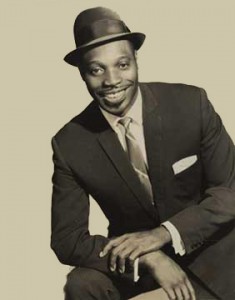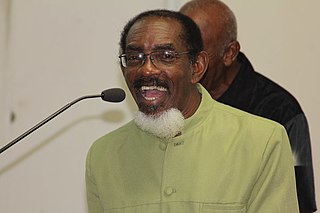This article includes a list of references, related reading, or external links, but its sources remain unclear because it lacks inline citations .(May 2019) |
Lancelot Layne (died 28 July 1990) was a rapso artist from Trinidad and Tobago.
This article includes a list of references, related reading, or external links, but its sources remain unclear because it lacks inline citations .(May 2019) |
Lancelot Layne (died 28 July 1990) was a rapso artist from Trinidad and Tobago.
Lancelot Layne was born to a Ms. Ethel Strawn (née Serrano) and raised in Gonzales, Trinidad, a village near Port of Spain. He had a start in many local singing shows and showcase forums in and about Trinidad. During his career, he travelled around the world giving lectures and shows at many music institutions and universities, and was one of the first artists to bring the music of Trinidad and Tobago to the rest of the world.
Layne took many trips to Africa, after studying African history. A 1998 United Nations Radio programme described the links between calypso and highlife music, focusing on an exchange of visits between Layne and high life musician Koo Nimo of Ghana. In later years, Layne joined the Orisa faith. He had a son, Brian Llenwyn Layne, and twin daughters, Niasha and Anuska, who are accomplished pannists.
He is often described as being the founder of rapso; his 1970 song "Blow Away" was the first rapso recording, although the term was not coined until 1980. Many of his most remembered songs were not recorded, including the song "Strike Squad", which he composed for his local football team. "Get Off The Radio" was a protest song about the imbalance of radio airplay between local and foreign works.
In 2016 German reissue company Cree Records/Bear Family Records released a comprehensive compilation album of Lancelot Layne's work. The artwork for the album was done by Trinidad based Painter Peter Doig.
Soca music is a genre of music defined by Lord Shorty, its inventor, as the "Soul of Calypso", which has influences of African and East Indian rhythms. It was originally spelled "sokah" by its inventor but through an error in a local newspaper when reporting on the new music it was erroneously spelled "soca"; Lord Shorty confirmed the error but chose to leave it that way to avoid confusion. It is a genre of music that originated in Trinidad and Tobago in the early 1970s and developed into a range of styles during the 1980s and after. Soca was initially developed by Lord Shorty in an effort to revive traditional calypso, the popularity of which had been flagging amongst younger generations in Trinidad due to the rise in popularity of reggae from Jamaica and soul and funk from the United States. Soca is an offshoot of Calypso/Kaiso, with influences from East Indian rhythms and hooks.
Calypso is a style of Caribbean music that originated in Trinidad and Tobago during the early to the mid-19th century and spread to the rest of the Caribbean Antilles by the mid-20th century. Its rhythms can be traced back to West African Kaiso and the arrival of French planters and their slaves from the French Antilles in the 18th century.

Lord Melody was a popular Trinidadian calypsonian, best known for singles such as "Boo Boo Man", "Creature From The Black Lagoon", "Shame & Scandal", "Jonah and the Bake", "Juanita", and "Rastaman Be Careful". Melody's career spanned forty years, from the beginnings of popular calypso music to his embrace of the more dance oriented Soca style by the late 1970s.

Aldwyn Roberts HBM DA, better known by the stage name Lord Kitchener, was a Trinidadian calypsonian. He has been described as "the grand master of calypso" and "the greatest calypsonian of the post-war age".
Slinger Francisco ORTT CM OBE, better known as Mighty Sparrow, is a Trinidadian calypso vocalist, songwriter, and guitarist. Known as the "Calypso King of the World", he is one of the best-known and most successful calypsonians. He has won Trinidad's Carnival Road March competition eight times, Calypso King/Monarch eight times, and has twice won the Calypso King of Kings title.
The music of Trinidad and Tobago is best known for its calypso music, soca music, chutney music, and steelpan. Calypso's internationally noted performances in the 1950s from native artists such as Lord Melody, Lord Kitchener and Mighty Sparrow. The art form was most popularised at that time by Harry Belafonte. Along with folk songs and African- and Indian-based classical forms, cross-cultural interactions have produced other indigenous forms of music including soca, rapso, parang, chutney, and other derivative and fusion styles. There are also local communities which practice and experiment with international classical and pop music, often fusing them with local steelpan instruments.
Rapso is a form of Trinidadian music that grew out of the social unrest of the 1970s. Black Power and unions grew in the 1970s, and rapso grew along with them. The first recording was Blow Away by Lancelot Layne in 1970. Six years later, Cheryl Byron was scorned when she sang rapso at a calypso tent; she is now called the "Mother of Rapso".
The music of Saint Vincent and the Grenadines includes thriving music scenes based on Big Drum, calypso, soca, steelpan and also reggae. String band music, quadrille, bélé music and traditional storytelling are also popular.
The culture of Trinidad and Tobago reflects the influence of Indian-South Asian, African, Indigenous, European, Chinese, North American, Latino, and Arab cultures. The histories of Trinidad and Tobago are different. There are differences in the cultural influences which have shaped each island. Trinidad and Tobago is an English-speaking country with strong links to the United Kingdom.
Byron Lee and the Dragonaires are a Jamaican ska, calypso and soca band. The band played a crucial pioneering role in bringing Caribbean music to the world. Byron Lee died on 4 November 2008, after suffering from cancer for a sustained period.

Fitzgerald Henry, better known as the Mighty Terror, was a Trinidadian calypsonian.

Calypso Rose or Linda McCartha Monica Sandy-Lewis is a Trinidadian calypsonian. She started writing songs at the age of 13; over the years, she has composed more than 1000 songs and recorded more than 20 albums. Considered the "mother of calypso", Rose was the first female calypso star and her lyrics frequently address social issues like racism and sexism. Her influence over the calypso music genre forced the renaming of the Calypso King competition to the Calypso Monarch instead. In addition to writing songs about social issues, Rose is also an activist and was given the title of UNICEF Goodwill Ambassador for former child soldiers along with performing at numerous events for social change. She has received every award available to living artists in the Caribbean.
As early as the 1780s, the word kaiso was used to describe a French creole song and, in Trinidad, kaiso seems to have been perfected by the chantwells during the first half of the 19th century. The chantwells, assisted by alternating in call-and-response style with a chorus, were a central component of the practice called Calinda (stick-fighting).

Hollis Urban Lester Liverpool, better known as Chalkdust, is a leading calypsonian from Trinidad and Tobago. He has been singing calypso since 1967 and has recorded more than 300 calypsos.
Lutalo Masimba, born Roy Lewis and known professionally as Brother Resistance, was a rhythm poet and musician from Trinidad and Tobago. He died on 13 July 2021, after being diagnosed with cancer.
Trinidadian and Tobagonian British people are citizens or residents of the United Kingdom whose ethnic origins lie fully or partially in Trinidad and Tobago.

Steven Springer was an American guitarist and songwriter known for his innovative smooth soft touch guitar style. He was best known for being a member of the Trinidad Tripoli Steel Band and for playing with Sir Lancelot Pinard, Arizona-based band Sanctuary, as well as founding the musical project Tropicooljazz.

Mark Antonio Jiminez, better known by his stage name Ataklan is a Trinidadian singer-songwriter and performer primarily of the modern rapso tradition. Ataklan has been referred to as "Trinidad's answer to Beck" and a "fiercely independent songwriter and singer and arguably the most original artist to have emerged on the island since David Rudder". Since his emergence in 1993, Ataklan has released tracks including "Flambo", "Naked Walk", "Flood on the Main Road", "Shadow in de Dark", "Soca Girl" and "Caribbean Swagga", among numerous others.
Lord Pretender was the stage name of Aldric Farrell, M.O.M., H.B.M. a calypsonian vocalist born on the island of Tobago widely acknowledged to be a "master" of extempo, a lyrically improvised form of calypso music. Starting with an impromptu performance at the age of 12, his career spanned nearly seven decades until cancer of the larynx forced him to retire in the mid-1990s.
Everard Romany aka Brother Shortman, also known as Rapso Rebel, is a rhythm poet and musician from Trinidad and Tobago.